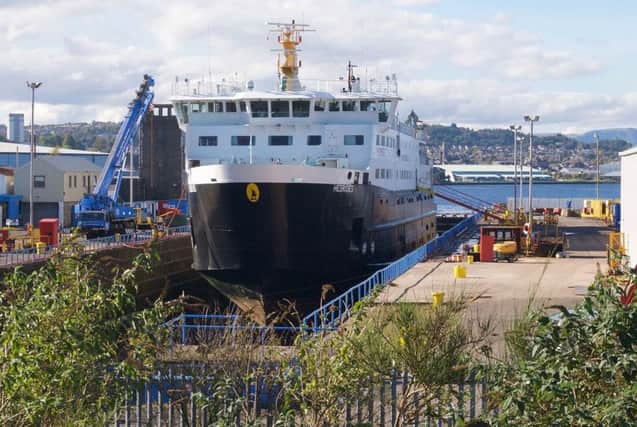Vital rescue craft replaced on CalMac’s largest ferries


The move comes as another ferry firm lost its appeal over planned Scottish Government subsidies for the NorthLink service, which CalMac is hoping to win back next month.
CalMac is replacing its fast rescue craft and launch equipment carried aboard its Hebrides, Isle of Lewis, Isle of Mull and Caledonian Isles vessels.
Advertisement
Hide AdAdvertisement
Hide AdThe Isle of Mull’s boat rescued a man who fell overboard from the ferry between Mull and Oban in May.
Gourock-based CalMac said the craft also provided assistance to the Coastguard and RNLI during incidents, and its ferries had been called out to assist 14 times last year.
A spokesman said: “CalMac has an important role in supporting the emergency services during incidents at sea, one which we drill for regularly.
“This is part of a modifications and upgrades programme of investment to ensure our fleet has the most modern equipment available.” so our operations can be carried out as efficiently as possible.”
Meanwhile, an appeal by Pentland Ferries against planned subsidies for NorthLink’s service between Scrabster in Caithness and Stromness in Orkney was rejected at the Court of Session in Edinburgh. The £370 million support also covers the Aberdeen to Kirkwall in Orkney and Lerwick in Shetland route.
Operator Serco is battling predecessor CalMac for the next contract for the service.
Pentland, which operates between Gills Bay in Caithness and St Margaret’s Hope in Orkney, raised a legal challenge which was rejected by Lord Boyd of Duncansby earlier this year.
It appealed against the ruling, but on Tuesday (23 July) three judges at the Court of Session in Edinburgh ruled the appeal be refused.
Advertisement
Hide AdAdvertisement
Hide AdThe firm, whose services are not subsidised, challenged the inclusion of NorthLink’s Scrabster route within the contract, arguing that subsiding it threatened its competing business. Its counsel, Mark Lindsay QC, earlier described the move as “an existential threat” to the ferry firm.
The Scottish Government invited bids for a new contract for the mainland to Northern Isles ferry links between Aberdeen, Kirkwall, Lerwick, Scrabster and Stromness which envisaged five ferries being deployed.
The estimated value of the subsidy for the contract over an eight year period is pounds 370 million and it is due to be awarded on August 2. Bidders included Serco, which currently runs services, and CalMac
Scotland’s senior judge the Lord President, Lord Carloway, said it was for the Scottish ministers to decide what would constitute an adequacy of service.
“If only the petitioners’ (Pentland Ferries) service operated, the respondents were entitled to hold that the services across the Pentland Firth would be inadequate,” he said
“The market would fail to meet the demand. There would be insufficient service to meet a real public need, especially in the peak season and if problems arose, for whatever reason, on the petitioners’ route,” he said.
The senior judge said the ministers were also entitled to take into account the advantages of the Scrabster crossing in terms of convenience as an alternative route.
Lord Carloway said “bundling” routes together was a recognised way of producing economies of scale and attracting operators.
Advertisement
Hide AdAdvertisement
Hide AdHe said it was not unlawful if it did not produce “undue market distortions” and it did not appear to do that.
Lord Drummond Young, who heard the appeal with Lord Carloway and Lord Menzies at the Court of Session, said that at this stage the court had to rely on the ministers observing their legal obligations in a proper manner.
He said: “Provided they do so, any risk to the economic viability of the petitioners’ own ferry service should be kept as a minimal level or eliminated.”